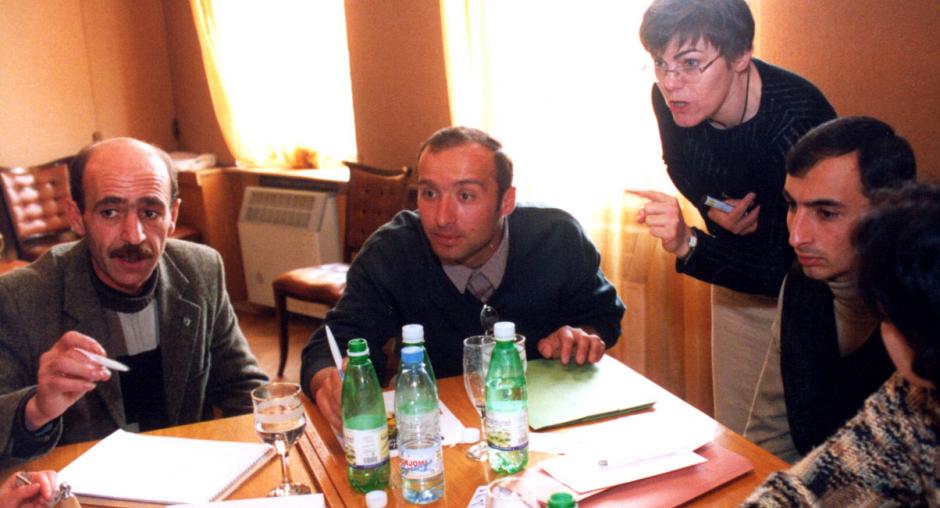Newsroom
OSCE human rights chief warns against use of "war on terrorism" to justify repression
LONDON/WARSAW 10 December 2003

Human rights monitoring and reporting training for NGOs, May 2002. (OSCE) Photo details
LONDON/WARSAW, 10 December 2003 - On the occasion of International Human Rights Day, the OSCE human rights chief, Ambassador Christian Strohal, has warned that the "war on terrorism" was being used in some countries as an excuse to suppress legitimate expressions of dissent and limit precious freedoms, in particular freedom of religion and belief, freedom of expression and freedom of assembly.
"There is a danger," he told a conference in London, "that States may use the on-going 'war on terrorism' to justify repression of political opposition and clampdowns on vulnerable parts of society, including ethnic or religious minorities."
Ambassador Strohal, Director of the Warsaw-based OSCE Office for Democratic Institutions and Human Rights, was addressing the opening session of a two-day London conference on the implementation of UN Security Council Resolution 1373 in south-eastern Europe. This UN resolution constitutes the global legal framework for combating terrorism.
He reminded the conference, which concludes tomorrow, that the OSCE adopted a new strategy to address threats to security and stability in the 21st century, at its recent Ministerial Council in Maastricht. This document acknowledges that all States have an obligation to fight terrorism, in order to protect their citizens.
"However," the ODIHR Director stressed, "no single state or organization can, on its own, meet the challenges facing us today with regard to terrorism, to trafficking in human beings or fighting discrimination and intolerance. Strong co-ordination and co-operation of all States and international organizations is therefore essential.
"The emergence of terrorist networks and other non-state actors as a major source of conflict and instability creates tremendous challenges," he added.
"There is an obvious temptation, when fighting terrorism, to bypass potential legal obstacles in favour of applying the principle of 'the end justifies the mean '. The OSCE has consistently maintained that it is crucial that the legitimate right of States to combat terrorism be exercised in full accordance with international law. This includes international human rights law and commitments."
Ambassador Strohal emphasized that a comprehensive strategy to address terrorism needed to tackle the roots causes of insecurity: "Claims of domination, discrimination and denigration of groups and individuals are often the triggering factors to violence. Human rights, promoting sustainable development and addressing environmental issues should be at the heart of each State's policies and action."
"There is a danger," he told a conference in London, "that States may use the on-going 'war on terrorism' to justify repression of political opposition and clampdowns on vulnerable parts of society, including ethnic or religious minorities."
Ambassador Strohal, Director of the Warsaw-based OSCE Office for Democratic Institutions and Human Rights, was addressing the opening session of a two-day London conference on the implementation of UN Security Council Resolution 1373 in south-eastern Europe. This UN resolution constitutes the global legal framework for combating terrorism.
He reminded the conference, which concludes tomorrow, that the OSCE adopted a new strategy to address threats to security and stability in the 21st century, at its recent Ministerial Council in Maastricht. This document acknowledges that all States have an obligation to fight terrorism, in order to protect their citizens.
"However," the ODIHR Director stressed, "no single state or organization can, on its own, meet the challenges facing us today with regard to terrorism, to trafficking in human beings or fighting discrimination and intolerance. Strong co-ordination and co-operation of all States and international organizations is therefore essential.
"The emergence of terrorist networks and other non-state actors as a major source of conflict and instability creates tremendous challenges," he added.
"There is an obvious temptation, when fighting terrorism, to bypass potential legal obstacles in favour of applying the principle of 'the end justifies the mean '. The OSCE has consistently maintained that it is crucial that the legitimate right of States to combat terrorism be exercised in full accordance with international law. This includes international human rights law and commitments."
Ambassador Strohal emphasized that a comprehensive strategy to address terrorism needed to tackle the roots causes of insecurity: "Claims of domination, discrimination and denigration of groups and individuals are often the triggering factors to violence. Human rights, promoting sustainable development and addressing environmental issues should be at the heart of each State's policies and action."
